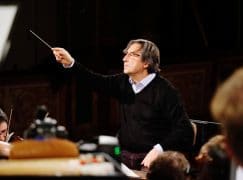Riccardo Muti: The public is being fooled
mainIn an interview with Richard Morrison in The Times today the maestro complains that Verdi keeps getting messed around:
‘I won’t tolerate what happened in Salzburg recently. The singer couldn’t sing the aria in the right key, so during the night the poor librarians had to write out all the orchestral parts in a different key just so the singer could put in a high note at the end that the composer hadn’t written anyway. I will not say who the singer was, but it was an immoral act. The public was being fooled.’
Muti says this would never happen with Mozart.
Hmmm…. let’s see…..






Another paywalled piece. Someone please post it.
I’ll post this from the site instead: “Register for your 2 complimentary articles every week”
Just enter a first and last name and an e-mail address and you have immediate access to the article. The whole process takes less than 30 seconds…
But he’s not complaining about anything as egregious as inserting an extraneous piece into an opera, just “cuts, transpositions, interpolations of high notes and all those other abuses you come across, especially in performances of Verdi and other Italian composers. If you did that to Mozart you would be killed by the Austrians, and by the English too.”
I’m not sure why he thinks this doesn’t happen with Mozart. Cuts and embellishments of vocal lines are very common in Mozart operas, and I don’t remember the Austrians ever killing anyone for it.
Of course, Muti famously forbids tenors from singing a high C at the end of Di quella pira. Even though (a) the audience loves it, and (b) Verdi said he didn’t mind it being done, as long as it was a good high C.
IIRC on his recording of Traviata, Muti allows the soprano to interpolate a high E-flat at the end of “Sempre libera.” Of course that was 20+ years ago, so maybe he didn’t feel the same way about it then.
“the poor librarians had to write out all the orchestral parts in a different key”
I am shocked that orchestra musicians can’t sight transpose on demand. Repetiteurs do it all the time. (Jazz and Broadway musicians do it all the time.)
I am shocked that all scores are not digitized, so that all one has to do is to hit the transpose button on the software and out comes each part!
(I am shocked musicians still use paper parts instead of an iPad, but that’s another discussion altogether.)
I am shocked that the musicians aren’t digitised, so that they can transpose reliably at the mere click of a button. And cheaper too, if that is what you are looking for.
Transposition is a lost art. A long time ago, it was a matter of course.
Every symphonic brass player (or amateur who plays Mozart Masses or the occasional Haydn Creation) transposes on a daily basis, since the parts are still written in the original keys and/or clefs, as well as e.g. trumpeters choosing whether a piece sits better on a modern Bb, C or D trumpet. The same is true for the clarinets. Other instruments have to play in multiple clefs (bassoon) or may be trained on multiple instruments (viola/violin). This does not leave many people in the orchestra who can’t transpose.
PS: Maurice Murphy, the late LSO principal trumpeter, said he “couldn’t” transpose. He’d sing the music in his head as written and then simply play it in the key needed 🙂 Surely worked.
Very interesting! I think Maurice Murphy’s is the best technique; requires a good ear though.
And Netrebko and husband have just cancelled their appearances at Baden Baden. Pity. I have tickets for Friday.
Having sat through Muti’s ridiculously slow Traviata at the Salzburg Festival 20 or so years ago, he has no room to talk. His largo tempi ruined the opera. Ask Frank Lopardo, or Andrea Rost who sung the leads. Sounds like the pot calling the kettle black.